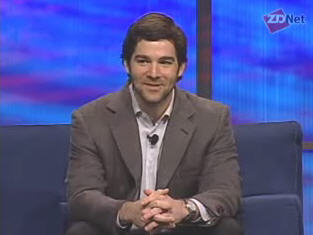Yahoo's challenge: Getting the social Web right

At the Web 2.0 Expo in San Francisco, John Battelle talked with Jeff Weiner, executive vice president of Yahoo’s Network Division, talked about Yahoo's opportunity to turn its half a billion user base into a more closely connected community spending lots of time on Yahoo's network and competing against Google.
He used the term "networked individualism" (via Howard Rheingold) rather than "social networking," and described Yahoo's goal as "tapping into people streams of consciousness" in real time, and "building the highest quality, most comprehensive, most vibrant repository of knowledge." My interpretation: Yahoo wants to be the place where people spend their time and engage with each other in cyberspace beyond search and what MySpace and Facebook provide today.
Weiner praised social networking phenomenon Facebook, which Yahoo has danced around with on the acquisition front, calling it "truly impressive," and acknowledged that Yahoo doesn't have a killer application like MySpace or Facebook.
However, he is betting that Yahoo's raw material--100 million users of Yahoo Groups, 7 million Yahoo Groups, 25 million Flickr users, and millions of users of Answers, del.icio.us, JumpCut, Bix, and other sites--can be pulled together to create something that is greater than the sum of the parts. Mike Speiser, the former CEO Bix, is heading up Yahoo's efforts to pull together the pieces.
Battelle (pictured on the right with Weiner photo by Dave McClure) asked Weiner about making big acquisitions, who responded, "There is no pressure to do big acquisitions. There is pressure internally to get strategy right and execute on it." Yahoo has been focusing on partnering with newspapers, Viacom and others, and on providing its programming and packaging prowess to give smaller players a taste of the Yahoo firehose, he said.
"At the end of day it's not about who is hot, it's not about who is getting attention today, it's about building companies that last," Weiner said, responding to a question about Google getting much of the attention and running circles around Yahoo. "Yahoo is the largest network. We reach half a billion users around the world...that's a significant asset....We do have extraordinary raw material to be working with and it's incumbent for us to get it right and execute in way we will be around for next 11 years and leading the Web."
Yahoo's future success may require more than getting more value out the current set of raw materials, especially if Google can keep up its aggressive acquisition and growth strategy.
Battelle asked Weiner about merging with Microsoft, which is also chasing Google in monetizing the Web as a platform in the search and ad space. A Microsoft/Yahoo marriage was a subject of much speculation in 2006. Weiner gave signals that Yahoo is open to working closely or extremely closely with Microsoft, after answering, "No plans that I know of." He first expressed regret that Microsoft decided to go it alone after a period of using Yahoo's search and ad services, and added that he liked the idea a very strong partnership with a company [Microsoft] to go up against a very strong competitor [Google].
It could be that Google's continued growth and acquisition strategy will drive Yahoo and Microsoft into each other's arms...
